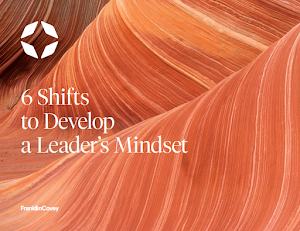25+ Questions to Help You Figure Out Good Development Goals
This article originally appeared on Microlearning, our bite-sized online solution for leaders and individual contributors.

It can be hard to know where to start when choosing development goals. Where do you want to go? And with multiple options out there, how do you narrow them down — and then determine the steps to take?
Use a mix of the questions in the six dimensions below to help you decide what to pursue next and to arrive at a goal that takes into account what you do well, what excites you, what’s feasible, and what you need to be successful. You don’t have to map out your whole career journey — just get a sense of the direction you want to head in.
Pick the questions that feel most relevant to you and what you value — and use your answers to figure out:
- What skills you’d like to learn or improve
- A next step you can take toward the role or reputation you want
- What support you’ll need to take that next step — and whom you can ask for help
Talents
A good place to start when considering your development goals: What am I already great at? Thinking through how you can flex and grow in those areas may reveal new paths for development that will benefit you and your organization.
Remember that your talents are broader than just your main job function. Consider your output (like concisely written reports, expertly crafted cakes, a well-organized store), hard skills (like proofreading, coding, pipe fitting), and soft skills (like relationship-building, communication, leadership, listening).
Ask yourself:
- What do I do exceptionally well — at work and outside of work?
- What comes easy to me?
- What do people look to me for?
- What have I been recognized for?
Interests
What gets you out of bed in the morning — and can motivate you to keep growing? At least some of those things should be incorporated into your development goals so you move toward doing work that’s consistently challenging and engaging.
Ask yourself:
- What do I love doing — at work and outside of work?
- If I could design my ideal role, project, or problem to solve, what would it look like?
- Who does work I find fascinating? How did they get to where they are? What skills are important in their roles?
- What work am I most excited to do — or to do more of?
- Whom do I most enjoy working with and learning from? Whom do I want to work with and learn from in the future?
- Over the past six to 12 months, what’s my favorite thing I’ve done at work? what’s my least favorite?
- In the course of my career, what work or work situations have I found most rewarding? most challenging?
Contributions
You can work toward a deeper sense of meaning and motivation in your career when you consider how you’d like to help others and address issues important to you. Your ideal contributions don’t have to be lofty (like fighting climate change or founding a company) — though they could be. There are many ways to make an impact for customers or users, community members, or the natural world.
Ask yourself:
- What difference would I like to make and for whom? What problems would I like to address?
- What needs exist in my team? my organization? my community?
- What issues are most important to my team? my organization? my customers or users?
- What work do I feel most proud of — and why?
Aspirations
Ultimately, where do you see yourself? And how do you want your peers and others to see you? These can be tough questions to answer, but once you start to get an idea, you can pick goals and next steps to help you build the connections, experience, and reputation you want.
Ask yourself:
- What do I aspire to do (like lead people, work at a prestigious organization, have influence in or beyond my workplace, gain expertise in my field)?
- What work or skills do I want to master?
- What level of responsibility do I want to have?
- How do I want to be recognized or rewarded?
- How do I want to be seen by others (as trustworthy, kind, innovative, a strong leader)?
Needs
Identifying your core personal and well-being needs could impact the development goals you pick or your timeline to reach them (if you decide to take a longer path to make space for other obligations). If you neglect those needs in a drive for career perfection, you could wind up feeling unfulfilled, unmotivated, and burnt out.
Ask yourself:
- What are my important personal needs and goals (financial security, flexibility, variety, work/life balance, being in a certain location)?
- In the course of my career, when have I felt bored, frustrated, or depleted at work? What was I doing and in what environment?
- What has been (or would be) my preferred work environment (remote or on-site, on a small or a large team, on the night or the morning shift, at a startup or an established organization, in the non-profit or the for-profit sector)?
- What has been (or would be) my preferred work culture (when my boss and colleagues supported me, when I had creative freedom, when I worked with a diverse group of people)?
Opportunities
You’ve envisioned many aspects of your ideal work life. Now, how do your ideas match what’s out there for someone with your talents and interests — in your organization, in your field, and beyond? Knowing this can help you keep your goals aligned with reality.
Ask yourself:
- What aspects of my field are growing? What roles and skills are in demand — in and beyond my organization?
- Whom could I reach out to for mentoring or help building my skills?
- How do people advance in my organization? If I’m not sure, whom could I ask?
- How could I bring even greater value to my team or organization? How could I help them meet their larger goals?
- What’s the next opportunity I see to make an impact?










